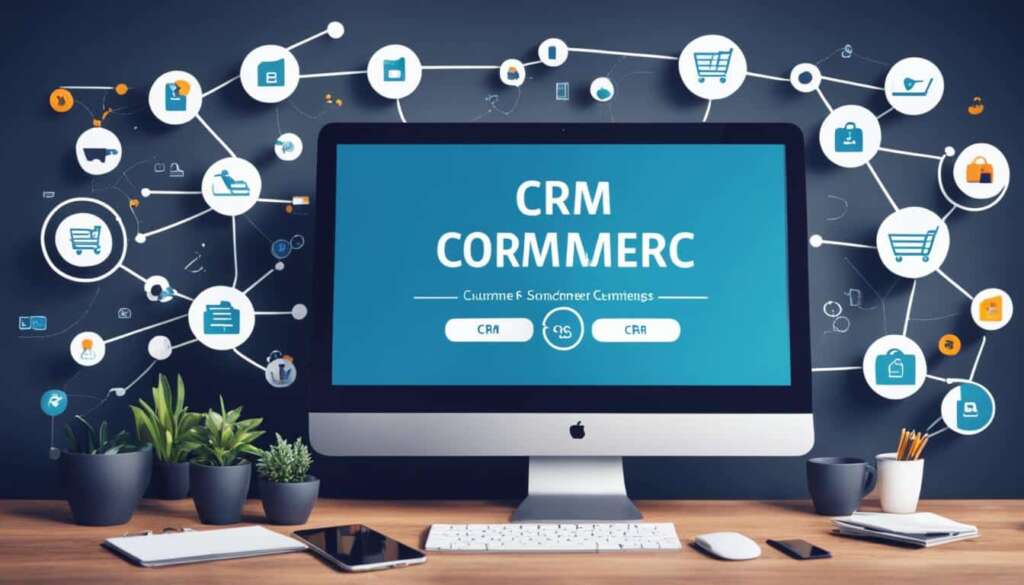Table of Contents
E-commerce marketing services are essential for businesses looking to increase their online sales. With the right marketing strategies in place, businesses can boost their online presence and attract more customers, ultimately leading to increased sales. In this article, we will explore the top e-commerce marketing services that can help businesses achieve their sales goals. From affiliate marketing programs to upselling and cross-selling techniques, customer interactions, and the use of analytics and mobile apps, we will cover a range of strategies that businesses can implement to enhance their e-commerce marketing efforts and drive sales.
Affiliate Marketing Programs for E-commerce Success
Affiliate marketing programs are a powerful tool for businesses to generate online revenue and drive sales. By partnering with affiliates, businesses can earn a commission for marketing their products. Affiliates promote the products through various channels and earn a profit from each sale. Sales are tracked through affiliate links, allowing businesses to monitor the effectiveness of their affiliate marketing efforts.
The Amazon Associates Program is a popular example of an affiliate marketing program that allows content creators, publishers, and bloggers to monetize their traffic.
With this program, individuals and businesses can sign up to become Amazon affiliates. They receive unique affiliate links to various Amazon products, which they can share with their audience. When someone clicks on an affiliate link and makes a purchase, the affiliate earns a commission.
Affiliate marketing programs offer several benefits for businesses:
- Online Revenue: By leveraging the reach and influence of affiliates, businesses can tap into new customer segments and generate online revenue.
- Drive Sales: Affiliates act as brand ambassadors, promoting products across different platforms and driving sales through their marketing efforts.
- Earn Commission: Businesses only pay affiliates when a sale is made, ensuring a cost-effective marketing strategy that aligns with business goals.
- Track Sales: With affiliate links and tracking systems in place, businesses can accurately measure the impact of affiliate marketing on their sales and optimize their strategies accordingly.
Maximizing Affiliate Marketing Success
To make the most of affiliate marketing programs, businesses should consider the following strategies:
- Select the Right Affiliates: Choose affiliates whose target audience aligns with your product or service. This ensures that your marketing message resonates with the right customers and increases conversion rates.
- Provide Marketing Materials: Equip affiliates with high-quality marketing materials, such as banners, product images, and persuasive content. This makes it easier for affiliates to promote your products effectively.
- Offer Competitive Commission Rates: To attract top-performing affiliates, provide competitive commission rates that incentivize them to prioritize your products over others.
- Track and Analyze Performance: Regularly monitor affiliate sales and analyze the performance of different affiliates, campaigns, and promotional channels. This helps identify the most effective marketing strategies and optimize future efforts.
“Affiliate marketing can be a game-changer for businesses, offering a cost-effective way to drive sales, expand online reach, and tap into new customer segments.” – Marketing Expert
Affiliate Marketing Success Story
Take the case of John, an aspiring fashion blogger who joined an affiliate marketing program with a popular online clothing retailer. With his engaging content and well-placed affiliate links, John successfully drove traffic to the retailer’s website and generated sales. His efforts earned him a steady commission stream that continues to grow with his expanding audience.
| Affiliate Marketing Program | Benefits | Commission Percentage |
|---|---|---|
| Amazon Associates Program | Monetize website traffic. | Up to 10% |
| Rakuten Affiliate Network | Access to a wide range of advertisers. | Varies by advertiser |
| ShareASale | Diverse range of product categories. | Varies by merchant |
Upselling and Cross-selling Strategies for Increased Sales
Upselling and cross-selling are two effective strategies that businesses can use to boost their sales. Upselling involves persuading customers to purchase a more premium or higher-cost version of a product they have already chosen, while cross-selling suggests a related or complementary product to prompt additional purchases. By implementing upselling and cross-selling techniques, businesses can increase their store’s average order value (AOV) and conversion rates. These strategies encourage customers to spend more and enhance their overall shopping experience.
The Power of Upselling
Upselling is a strategy that allows businesses to offer customers a higher-cost version of the product they are interested in. By highlighting the benefits and value of the premium option, businesses can entice customers to upgrade their purchase. This not only increases the immediate revenue of the sale but also improves the overall customer experience by providing access to a higher-quality product.
To successfully implement upselling:
- Identify products or services that have higher-cost versions or additional features.
- Highlight the enhanced benefits and value that customers can enjoy with the premium option.
- Position the upsell as a valuable upgrade that aligns with the customer’s needs and desires.
- Offer incentives such as discounts or exclusive deals to encourage customers to choose the higher-cost version.
The Benefits of Cross-selling
Cross-selling involves recommending related or complementary products to customers during the purchasing process. This strategy aims to increase the customer’s average order value by enticing them to add more items to their shopping cart. By suggesting additional products that enhance the primary purchase, businesses can boost their sales and provide a more comprehensive solution to customers’ needs.
To effectively cross-sell:
- Understand customers’ preferences and shopping habits to identify relevant and complementary products.
- Present cross-selling suggestions at strategic points during the purchase journey, such as on product pages or in the shopping cart.
- Focus on products that genuinely provide value and enhance the customer’s overall experience.
- Personalize cross-selling recommendations based on individual customer data and purchasing history.
By implementing both upselling and cross-selling strategies, businesses can maximize their customers’ purchasing potential and drive increased sales. These techniques not only boost the store’s average order value but also enhance customer satisfaction and loyalty.
| Upselling | Cross-selling |
|---|---|
| Higher-cost versions | Related or complementary products |
| Increases immediate revenue | Improves customer experience |
| Enhances perceived value | Increases average order value |
| Provides access to premium features | Offers a comprehensive solution |

Leveraging Customer Interactions for Marketing Success
Customer interactions are key to unlocking marketing success and driving sales for businesses. By capitalising on positive customer experiences, businesses can enhance their marketing efforts and attract new customers. The use of customer reviews, testimonials, and case studies is a powerful way to showcase the benefits of a business’s products and services, cultivate trust in their brand, and influence purchasing decisions. Online reviews, in particular, hold tremendous sway over customers and can significantly impact their buying choices.
Actively monitoring, analysing, and responding to customer reviews allows businesses to build a strong online reputation and attract new customers. By engaging with customers, businesses can address concerns, provide additional information, and demonstrate their commitment to customer satisfaction. Such interactions play a crucial role in fostering trust and establishing long-term relationships with customers, ultimately leading to increased sales and business growth.
“Our customers’ feedback has been instrumental in shaping our marketing strategy. Through their honest reviews and testimonials, we have gained valuable insights into what matters most to our target audience and have been able to tailor our offerings accordingly.”
The Power of Customer Reviews
Customer reviews are a valuable asset for businesses. They not only provide social proof but also serve as a reliable source of information for potential customers. Positive reviews build confidence in the quality and reliability of a product or service, encouraging potential customers to make a purchase. Conversely, negative reviews provide businesses with an opportunity to identify areas for improvement and rectify issues, thus demonstrating a commitment to customer satisfaction.
The Impact of Testimonials and Case Studies
Testimonials and case studies offer a more in-depth perspective on how businesses have positively impacted their customers. By highlighting success stories and tangible results, testimonials and case studies add credibility and trust to a business’s marketing efforts. They provide potential customers with real-life examples of how a product or service has met or exceeded expectations, making it easier for them to make informed purchasing decisions.
Utilizing E-commerce Analytics to Optimize Sales
E-commerce analytics is an invaluable tool that provides businesses with data-driven insights into customer behavior and interactions. By analyzing this data, businesses can optimize their sales strategies and identify opportunities for improvement and innovation. Understanding consumer behavior is essential for making informed decisions and driving online sales.
With the help of tools like Google Analytics and Similarweb, businesses can track and analyze various metrics to gain a deeper understanding of their website traffic, user engagement, and conversions. These analytics dashboards provide comprehensive data that can be leveraged to drive online sales and enhance the overall performance of an e-commerce business.
The Importance of Data-Driven Insights
Data-driven insights derived from e-commerce analytics enable businesses to make informed decisions based on real-time information. By examining consumer behavior patterns and trends, businesses can identify areas for optimization and refine their sales strategies. For example, if analytics reveal that a certain product category is consistently attracting high traffic but experiencing low conversions, businesses can adjust their marketing efforts or make improvements to the product page to increase sales.
“E-commerce analytics allows businesses to make informed decisions and optimize their sales strategies based on real-time data.”
Data-driven insights also help businesses identify emerging consumer trends and shifts in behavior. By staying updated on these trends and adapting their strategies accordingly, businesses can proactively meet customer expectations and drive online sales. For instance, if analytics reveal a growing preference for mobile shopping, businesses can prioritize mobile optimization to provide a seamless shopping experience for their customers.
The Role of Consumer Behavior Analysis
Consumer behavior analysis is a crucial component of e-commerce analytics. By understanding how customers interact with a website, which products they prefer, and what factors influence their purchasing decisions, businesses can tailor their sales strategies to maximize conversions. For example, if analytics reveal that customers tend to abandon their carts during the checkout process, businesses can optimize the checkout flow to minimize friction and improve the overall user experience.
Driving Online Sales through Optimization
One of the key objectives of e-commerce analytics is to drive online sales through optimization. By continuously monitoring and analyzing data, businesses can identify areas for improvement and implement strategies to increase conversion rates. For instance, if analytics show that a particular marketing campaign is generating higher sales, businesses can allocate more resources to it or replicate its successful elements in other campaigns.
Optimization can also involve A/B testing different strategies to determine the most effective approach. By comparing the performance of different variations, businesses can identify the tactics that yield the highest conversion rates and revenue. For example, e-commerce analytics can help businesses determine whether offering free shipping or a discount code leads to higher sales.
| Benefit of E-commerce Analytics | Example |
|---|---|
| Identification of high-performing products | Analytics reveal that Product A consistently generates the highest sales and conversions. |
| Identification of underperforming products | Analytics show that Product B receives a high amount of website traffic but has a low conversion rate. |
| Identification of customer segments | Analytics reveal that a specific demographic group has the highest average order value. |
| Conversion rate optimization | Analytics indicate that simplifying the checkout process leads to a higher conversion rate. |
| Monitoring marketing campaign performance | Analytics show that a recent email marketing campaign resulted in a significant increase in sales. |
E-commerce analytics is an essential tool for businesses looking to drive online sales. By utilizing data-driven insights and understanding consumer behavior, businesses can optimize their sales strategies and stay ahead of their competitors in the ever-evolving e-commerce landscape.
Mobile Apps for Efficient E-commerce Management
Mobile apps have revolutionized the way businesses manage their e-commerce operations. With the rise of smartphones and tablets, businesses can now conveniently handle their e-commerce activities while on the move. One such app that stands out in the market is the Amazon Seller app, designed to streamline and optimize the management of e-commerce businesses.
With the Amazon Seller app, businesses can access crucial sales data, monitor inventory, and manage customer reviews seamlessly. This mobile app offers a myriad of features that enable businesses to stay connected and control their operations effectively.
“The Amazon Seller app has been a game-changer for my e-commerce business. I can check my sales, manage my inventory, and respond to customer reviews anytime, anywhere. It has made running my business so much more convenient and efficient.” – Sarah Thompson, E-commerce Entrepreneur.
One of the key advantages of using mobile apps for e-commerce management is remote inventory management. With the Amazon Seller app, businesses can easily update their inventory, track stock levels, and receive real-time notifications when items are running low. This feature ensures that businesses never miss a sale due to inventory shortages.
Another valuable feature that mobile apps offer is customer review management. Businesses can quickly respond to customer reviews, address concerns, and maintain a positive relationship with their customer base. By leveraging customer feedback and taking prompt action, businesses can enhance customer satisfaction and loyalty.
Moreover, mobile apps provide instant notifications, enabling businesses to address issues promptly and minimize disruptions to their e-commerce operations. Whether it’s an order update, a new customer message, or a review notification, businesses can stay on top of their business activities without being tied to a computer.
The convenience and efficiency offered by mobile apps like the Amazon Seller app have made them indispensable tools for today’s e-commerce businesses. By leveraging these apps, businesses can manage their operations effectively, save time, and make informed decisions to drive increased sales and customer satisfaction. Embracing the power of mobile technology empowers businesses to stay ahead of the competition in the ever-evolving e-commerce landscape.
Optimize your e-commerce management with the power of mobile apps like the Amazon Seller app, and take your business to new heights of success.

Conclusion
In conclusion, e-commerce marketing services are invaluable for businesses looking to boost sales and strengthen their online presence. By implementing effective marketing strategies, such as affiliate marketing programs, upselling and cross-selling techniques, leveraging customer interactions, utilizing e-commerce analytics, and utilizing mobile apps for efficient e-commerce management, businesses can drive sales and achieve increased revenue.
By staying current with evolving trends in the e-commerce landscape and implementing the right marketing services and strategies, businesses can position themselves for success in the highly competitive e-commerce market. With the assistance of expert e-commerce marketing services, businesses can elevate their online presence, expand their customer base, and drive sustainable growth.
In today’s digital age, it is essential for businesses to leverage the power of e-commerce marketing to stay ahead of the competition. By implementing these strategies and utilizing the right tools and techniques, businesses can effectively engage with their target audience, drive conversions, and maximize their sales potential. Don’t miss out on the opportunity to make the most of e-commerce marketing services and take your business to new heights!
FAQ
What are e-commerce marketing services?
E-commerce marketing services are expert strategies and techniques implemented to boost online sales and enhance the business’s online presence.
How can e-commerce marketing services help businesses boost their sales?
By utilizing effective marketing strategies, businesses can increase their online presence, attract more customers, and ultimately drive higher sales.
What are affiliate marketing programs and how do they contribute to e-commerce success?
Affiliate marketing programs enable businesses to partner with affiliates who promote their products through various channels, earning a commission for each sale made through their efforts.
What is the purpose of upselling and cross-selling in e-commerce?
Upselling involves persuading customers to purchase a more premium version of a product, while cross-selling suggests related or complementary products to prompt additional purchases, both of which boost sales and increase average order value.
How do customer interactions contribute to marketing success in e-commerce?
Positive customer experiences, showcased through customer reviews, testimonials, and case studies, help enhance marketing efforts, build trust in the brand, and attract new customers.
What role does e-commerce analytics play in optimizing sales?
E-commerce analytics provide valuable data-driven insights into customer behavior, allowing businesses to optimize their sales strategies, make informed decisions, and drive more online sales.
How can mobile apps contribute to efficient e-commerce management?
Mobile apps, such as the Amazon Seller app, allow businesses to manage their e-commerce operations on the go, accessing sales data, inventory management features, and resolving issues promptly, leading to increased sales and customer satisfaction.













